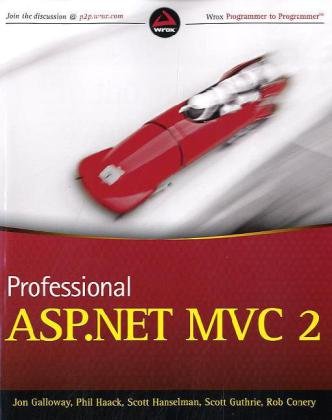
Professional ASP.NET MVC 2
- Length: 552 pages
- Edition: 1
- Language: English
- Publisher: Wrox
- Publication Date: 2010-06-28
- ISBN-10: 0470643188
- ISBN-13: 9780470643181
- Sales Rank: #3615583 (See Top 100 Books)
Top-selling MVC book from a top team at Microsoft—now fully updated!
ASP.NET MVC 2.0 is now available and shipping with Visual Studio 2010 and .NET 4. A new update to Microsoft’s Model-View-Controller technologies, MVC 2 enables developers to build dynamic, data-driven Web sites. Professional ASP.NET MVC 2 shows you step-by-step how to use MVC 2. You’ll learn both the theory behind MVC 2, as well as walk through practical tutorials, where you’ll create a real-world application. Topics include transitioning from ASP.NET development, as well as an overview of related tools and technologies, including LINQ, jQuery, and REST.
This book is divided into two very broad sections, each comprising several chapters.
The first half of the book is concerned with introducing the MVC pattern and how ASP.NET MVC 2 implements that pattern.
Chapter 1 “NerdDinner” uses a small but complete application to walk you through how to build an ASP.NET MVC 2 application and some of the core concepts behind ASP.NET 2 MVC.
Chapter 2 “Model-View-Controller and ASP.NET” starts off with a description of the Model-View-Controller pattern, explaining the basic concepts of the pattern and providing a bit of its history. The chapter goes on to describe the state of the MVC pattern on the web today as it is implemented by various frameworks, such as ASP.NET MVC 2.
Chapter 3 “ASP.NET > ASP.NET MVC” then covers the ways that ASP.NET MVC is different from ASP.NET Web Forms.
Chapter 4 “Routes and URLs” digs deep into routing to describe the role that URLs play in your application and how routing figures into that. It also differentiates routing from URL rewriting and covers a bit on extending routing and writing unit tests for routes.
Chapter 5 “Controllers” takes a look at controllers and controller actions-what they are, and how to write them. It also covers action results, which are returned by controller actions and what they are used for.
Chapters 6 “Views” and 7 “Ajax” cover views and view engines, and then add a little flavor on top by examining the role that AJAX plays in your views.
The second half of the book focuses entirely on advanced techniques and extending the framework.
Chapter 8 “Filters” goes into detail on action filters, which provide an extensibility point for adding cross-cutting behaviors to action methods.
Chapter 9 “Securing Your Application” covers security and good practices for building a secure application.
Chapter 10 “Test Driven Development with ASP.NET MVC” provides a brief introduction to Test Driven Development (TDD) as it applies to ASP.NET MVC.
Chapter 11 “Testable Design Patterns” shows you real-world patterns and practices for building applications that are testable.
Chapter 12 “The Best of Both Worlds: Web Forms and MVC Together” discusses how Web Forms and MVC work together.
Chapter 13 “What’s New in ASP.NET MVC 2” covers what’s new in MVC 2.
This book is for web developers who are looking to add more complete testing to their web sites, and who are perhaps ready for “something different.”
In some places, we assume that you’re somewhat familiar with ASP.NET WebForms, at least peripherally. There are a lot of ASP.NET WebForms developers out there who are interested in ASP.NET MVC so there are a number of places in this book where we contrast the two technologies. Even if you’re not already an ASP.NET developer, you might still find these sections interesting for context, as well as for your own edification as ASP.NET MVC may not be the web technology that you’re looking for.







